|
|
|
Sort Order |
|
|
|
Items / Page
|
|
|
|
|
|
|
| Srl | Item |
| 1 |
ID:
104671
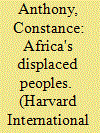

|
|
|
| 2 |
ID:
091430
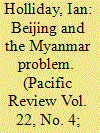

|
|
|
|
|
| Publication |
2009.
|
| Summary/Abstract |
The re-emergence of China as a major economic and political power has drawn attention to the role it might play in solving regional problems. Prominent among many Asian issues on Beijing's agenda is its southwestern neighbour, Myanmar, and in particular the military machine that has long ruled the country with an iron fist. The junta in place today is both acknowledged as problematic by policymakers in Beijing, and seen by the wider world as a regional challenge on which China should take the lead. However, there is little agreement on ways forward. To determine how Beijing might handle the Myanmar problem, this article first examines the concept of intervention, reviewing the manifold modes found in the contemporary world and drawing up a typology. Then it surveys arguments about intervention, focusing on perspectives that are relevant in this context. Next it presents arguments about intervention in Myanmar, and follows up by looking in some detail at China's current low-level engagement. Finally it considers where Beijing might go from here in dealing with Myanmar. The argument pulled together in the conclusion is that while nobody has a full solution to the Myanmar problem, a case for enhancement of China's role can be grounded not only in its global obligations, but also in precepts found deep in its national tradition. It is here that efforts to boost Beijing's engagement should be directed.
|
|
|
|
|
|
|
|
|
|
|
|
|
|
|
|
| 3 |
ID:
057958
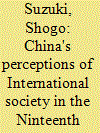

|
|
|
| 4 |
ID:
128481
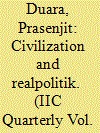

|
|
|
| 5 |
ID:
145147
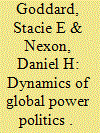

|
|
|
|
|
| Summary/Abstract |
We call for a research program focused on the dynamics of global power politics. Rather than link realpolitik to structural-realist theoretical frameworks or the putatively anarchical character of world politics, the program treats power politics as an object of analysis in its own right. It embraces debate over the nature of global power politics among scholars working with distinctive approaches. It sees the structural contexts of power politics as highly variable and often hierarchical in character. It attenuates ex ante commitments to the centrality of states in global politics. And it takes for granted that actors deploy multiple resources and modalities of power in their pursuit of influence. What binds this diverse research program together is its focus on realpolitik as the politics of collective mobilization in the context of the struggle for influence among political communities, broadly understood. Thus, the study of the dynamics of collective mobilization—the causal and constitutive pathways linking efforts at mobilization with enhanced power—brings together approaches to security studies in a shared study of power politics.
|
|
|
|
|
|
|
|
|
|
|
|
|
|
|
|
| 6 |
ID:
096690


|
|
|
|
|
| Publication |
2010.
|
| Summary/Abstract |
From the earliest years of the Internet's creation, cyberspace has been distinguished from other types of political space because of three unique qualities: (i) its ability to mobilize users, particularly "outsiders" including those who have not been easily included in political systems using conventional means; (ii) its ability to quickly provide large quantities of information of uncertain or unregulated quality; and (iii) its ability to shrink distances between users, in some sense rendering conventional physical geography irrelevant. This paper presents three lenses for interpreting the significance of these developments: utopian, liberal, and realist. Evolving doctrines of cyberwarfare as put forth by China, Russia, and the United States in particular stress the ways in which cyberspace presents a unique security threat which may present greater advantages to nonstate actors engaged in unconventional warfare. Differing economic, political, and security policies derive from each lens.
|
|
|
|
|
|
|
|
|
|
|
|
|
|
|
|
| 7 |
ID:
141736
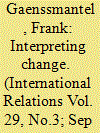

|
|
|
|
|
| Summary/Abstract |
This article examines why and how China upgraded its engagement with the European Union (EU) in the years between 2001 and 2004, with reference to pre-existing foreign policy traditions and practices in reform-era China. It argues that most of the observed changes can be explained with reference to two dynamics. First, the changing international environment, mostly with regard to the roles of the United States and the EU, challenged the established approach to foreign policy inherited from Deng Xiaoping, China’s pre-eminent leadership figure from the late 1970s to the mid-1990s. In this sense, the shift towards the EU was part of wider efforts to solve this dilemma. Second, differences in how various groups in the Chinese foreign policy establishment understood and implemented Deng’s guidelines and their respective influence in policy-making can help to grasp some of the more specific developments in Chinese policy towards the EU in the early 2000s. To supplement this main claim, the article also critically evaluates the changes less well explained by these two dynamics and proposes additional explanations.
|
|
|
|
|
|
|
|
|
|
|
|
|
|
|
|
| 8 |
ID:
051569
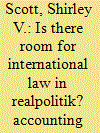

|
|
|
| 9 |
ID:
153436


|
|
|
|
|
| Summary/Abstract |
Against the historical background of international criminal justice since the end of World War I, this comment analyzes the obstacles and difficulties faced by the International Criminal Court to establish its legitimacy and authority in the context of global power relations. By reference to the position of the African Union, the systemic crisis of the ICC is highlighted in regard to structural (related to Statute and ratification status) as well as performance-related issues (concerning the investigative and prosecutorial practice in the Court’s 15 years of existence).
|
|
|
|
|
|
|
|
|
|
|
|
|
|
|
|
| 10 |
ID:
092665
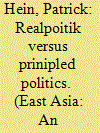

|
|
|
| 11 |
ID:
175661
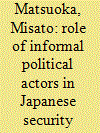

|
|
|
|
|
| Summary/Abstract |
Japan’s security policymaking has undergone change since 2012 amidst institutional reforms under the second Abe Shinzō administration. This article explores the under-appreciated role of informal political actors—especially heavyweight academics—in shaping Japanese security policymaking under the second Abe administration. Although these actors have always been present, this article argues that they have become more visible and influential, especially under the second Abe administration by supporting Japan’s Realpolitik stance. Differentiating from ‘embedded scholars’ (goyō gakusha), it scrutinises whether the activities of academics have become more relevant as part of a more centralised policymaking process. Considering the existing literature on Japan’s security policymaking and Kantei diplomacy, this article examines the extent to which informal political actors have exerted influence on Japan’s security policymaking, with explicit comparison with earlier governments. It particularly focuses on the role of Kitaoka Shin’ichi, a Japanese academic who has played the central role in shaping Japan’s security policymaking in the post-Cold War period. In so doing, this article explores the ways in which Abe’s Kantei-led political decision-making style has empowered informal political actors to contribute to strategic thinking regarding Japanese foreign and security policy.
|
|
|
|
|
|
|
|
|
|
|
|
|
|
|
|
| 12 |
ID:
089329
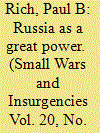

|
|
|
|
|
| Publication |
2009.
|
| Summary/Abstract |
This paper explores historically Russia's status as a great power in first the European and later the global states system. It argues that its role as a 'superpower' was really a temporary aberration during the Cold War period and that since the collapse of the Soviet Union Russian foreign policy has been essentially guided by the desire to reaffirm its great power status and emergence as an energy superpower centred on the export of oil and gas. Western policy towards Russia needs to be guided by a far more sophisticated awareness of this transformation and a greater understanding of the importance of the symbols of power and status that might look rather dated and backward looking in terms of the construction of regional European security and the 'post-national' project of the European Union.
|
|
|
|
|
|
|
|
|
|
|
|
|
|
|
|
| 13 |
ID:
168590


|
|
|
|
|
| Summary/Abstract |
How do states’ desires to perform an international-societal role interact with the imperative to safeguard their security in an anarchic international system? Using the case of the contemporary United Kingdom, this article explores the tensions between roleplay and realpolitik—gaining social recognition as a particular kind of state while doing what it takes to survive—through one key role conception, “Great Power.” Recent scholarship has dubbed Britain a “residual Great Power”: lacking the wherewithal to impose regional order through preponderance, it is still cast into the role of militarized international order-upholder by the allies whose support is necessary for such role-sustainment, America and France. Yet this role-based approach sets a different threshold on capability than the requirement to undertake survival-essential military missions, independent of potentially unreliable allies’ charity—realists’ understanding of “great power.” Theoretically, therefore, the article demonstrates that roleplay and realpolitik remain separate incentive structures underlying states’ foreign policy choices. Empirically, meanwhile, the article shows—through opportunity-cost force-posture analysis—that contemporary Britain is torn between the logics. Striving for independent self-protection capabilities, above-and-beyond the “residual power” criterion, London nonetheless makes a residual power's implicit assumptions about alliance support in the deployment of those capabilities.
|
|
|
|
|
|
|
|
|
|
|
|
|
|
|
|
| 14 |
ID:
086150
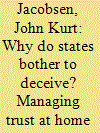

|
|
|
|
|
| Publication |
2008.
|
| Summary/Abstract |
Why do democratic states try to deceive their own citizens as to the foreign policies they practice, their motives, and their consequences? This question presupposes not only that states craft 'stories' to disguise activities abroad, but that they do so because they are constrained by an audience of non-elite actors. Theories derived from realpolitik, at best, make little allowance for such domestic 'interference'. Yet there is evidence that in democracies the role of mass publics in driving, curbing, or modifying the conduct of foreign policy is a force, and explanatory factor, to reckon with.
|
|
|
|
|
|
|
|
|
|
|
|
|
|
|
|
|
|
|
|
|